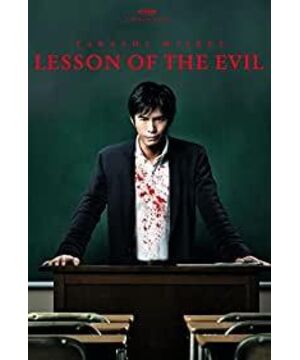The ancient book review, the hard drive was broken, and the information was organized, and I was afraid of losing it, so I posted it. It was very immature, and it was purely self-entertainment.
I always feel that compared to the local names of many movies, this drama is very consistent in Japanese and English.
A film about a perverted teacher killing students, why is it such a bad teaching material? Is it just the evil manifested in the massacre? If so, it is obviously too individual to be a so-called textbook. You must know that the role of textbooks is to educate, and such a movie in which evil conquers controversy is obviously not used to educate this result.
So where exactly is its lesson?
From this point of view, I very much agree with the point of view of a netizen I saw before. The analysis here is the relationship between reason and evil. As a complete anti-social element, the protagonist Hasumi-sensei is a handsome guy but has no empathy ability. The ability to empathize sounds amazing, but in fact, it is empathy and sympathy. Although we don't really feel the pain of others, and the ability to empathize is just a myth, the impulses that generate or drive this behavior are themselves the foundation of society. It lays the groundwork for the possibility of fantasizing and for this nation-state or social group in the context of a common origin. That's why these types of people are called sociopaths, their inability to feel emotions doesn't mean they're bound to become serial killers, although I think it's almost always the case, and more importantly, their character makes them inevitable and Society is out of place.
So here comes the problem.
Isn't the rationalism that Adam Smith emphasized in the Wealth of Nations, Locke and other rationalists later on? How could they be anti-social. Know that it is rational people who make the invisible hand work. But here is only the logic of the economic man. I haven't read Smith's book on ethics, but it's easy to imagine the incompleteness of his theory in explaining ethics. Because ethics is ultimately a product of society, and society is not so much human reason as it is irrationality, the community gathering behind festivals and other carnivals, and the clan gathering to cope with war is ultimately to resist instability. Society needs the rational operation of human beings, but the cohesion brought about by irrationality is indeed needed at critical times. In modern times it is called patriotism. The same goes for the movie. Also facing the risk of being killed, once saw Keisuke's sword, and once was bumped into after killing Miya. Not only did Mr. Hasumi not panic, but he quickly found a solution. Correspondingly, the students saw the shotgun again. When a person is stunned, or screaming in panic, running around, or completely stunned, it is not a manifestation of rationality. It is because of the weaknesses brought about by these emotions that we gather together for warmth, which is the emotional basis for the survival of society. To a sociopath, this is not only redundant but also stupid.
The expansion of rationalism must be followed by the expansion of individualism, which is obviously incompatible with socialism. And this is the lesson hiding behind this evil deed? The contradiction between the sociopath as the ultimate rational person and society.
After teaching the scriptures, let’s talk about human nature. According to the comments, many netizens will compare this scripture of evil with the confession. In fact, it is really difficult to discuss which is higher and which is lower. The former is a conspiracy. Whether it is the death of the daughter, the cover-up, or the revenge of the teacher at the end, it is all about the evil under the night. It can be said to be the appearance of evil. There is room for it, it is said that when the teacher sees the child in the last scene, there is no struggle in his eyes, so this is still the human nature of the appearance, that is, whether to do evil or not. Although the canon of evil does not go around in circles, it is actually more straightforward, cutting through the epidermis directly, and discussing a real and essential issue, that is, what is evil. It is not a question of whether to do evil, but a question of how to treat it. When I read the confession, I went from blood to cold, because I felt that the teacher's revenge was justified. The author's kindness to the father, the lovely daughter, and the general helplessness of the teacher made this murder itself a kind of substitute. The legitimacy of heaven's way, but when I look at the scriptures of evil, my whole body is cold to blood, because the teacher's behavior itself is its legitimacy - everything is for survival, there is no excuse, there is no appearance of justice. Some netizens have specially discussed the plot of seducing female students. Lian Shi gets along with people by observing and analyzing human nature, so he always treats everyone gently to achieve their inner needs, so he is liked by people. Some netizens said that he was with her because he didn't want to disappoint the girl. I don't think so, knowing that his reaction after being just confessed by a girl was to keep his distance. He was calculating which would be more beneficial. As a rational person, choosing a beautiful underage girl as a sex object to vent your inner desires and get it is very cost-effective. Lian Shi is not exactly the same as ordinary men, because he cannot feel the pleasure brought by the ambiguous eyes of men and women, so his feelings about sex are completely physiological. To put it bluntly, the tightness of the lead directly determines his sexuality The degree of pleasure, so he chooses a female student to develop a relationship with is a choice that maximizes the benefits. Not to mention that he also got the opportunity to log in to the forum to spread rumors. If you don't analyze it from this perspective, you will misunderstand the motives of Hasumi's survival. He and others are empty and condescending to maximize interests. In the end the schoolgirl interprets his actions as a game. The word game will make people think that he is a murderer who kills for the thrill of killing. I don't think this is appropriate. Since he can't feel emotions, how does killing people touch the physical pleasure? Rather than saying that he kills for the pleasure of plundering other people's lives, it is better to say that he enjoys the pleasure of maximizing profits.
I privately believe that there are many types of perverted murderers. Those who really kill for pleasure are actually people, that is, driven by desire. A perverted murderer who kills for profit seems to belong to a sociopath. Whether or not to kill depends on the situation and state of mind, such people are really unpredictable. Just like Lian Shi and his murderous partner, it is impossible to predict when Lian Shi will kill him. After finding that he is useless, he can kill him immediately, or kill him in a few days, harmless and useless. This kind of pure evil itself has a great incitement, compared to the evil that needs legitimacy, this evil comes from human nature itself. We will cheer for the teacher's revenge, but not everyone can achieve her perfection, but if we are Hasumi, we will definitely make the same choice as him.
Finally, on the relationship between divinity and reason. Some netizens wrote that the changes in the eyes of Odin, the crow, and the girls at the end of the film, which appeared many times in the movie, were actually alluding to the divinity contained in Lian Shi's behavior, that is, Lian Shi claimed to be a god, although he wanted to escape. An excuse for sin, but there is some commonality between the absolute rationality and divinity contained in Hasumi's actions. Is God rational? This seems a little one-sided. Even in the Norse mythology system, there are Chaos Gods and Bacchus. In divinity, are sensibility and reason divided, or are they separated? Are order and chaos one or a cycle? This should be the problem, right?
20150805
View more about Lesson of the Evil reviews








